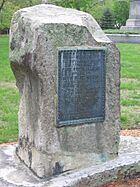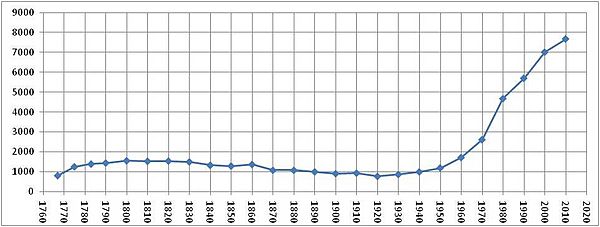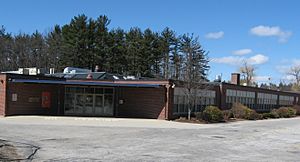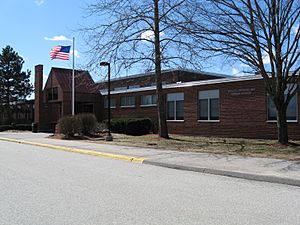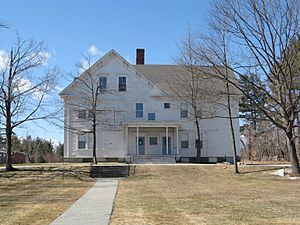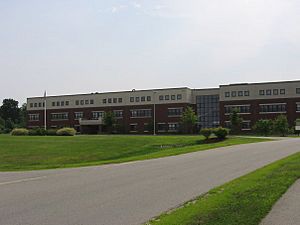Hollis, New Hampshire facts for kids
Quick facts for kids
Hollis, New Hampshire
|
||
|---|---|---|
|
Town
|
||
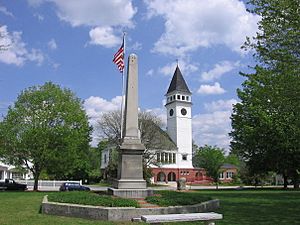
Monument Square with Hollis Town Hall
|
||
|
||
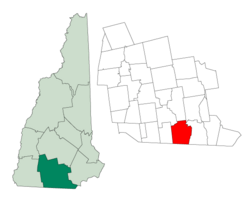
Location in Hillsborough County, New Hampshire
|
||
| Country | United States | |
| State | New Hampshire | |
| County | Hillsborough | |
| Incorporated | April 3, 1746 | |
| Area | ||
| • Total | 32.30 sq mi (83.65 km2) | |
| • Land | 31.73 sq mi (82.18 km2) | |
| • Water | 0.57 sq mi (1.47 km2) 1.76% | |
| Elevation | 404 ft (123 m) | |
| Population
(2020)
|
||
| • Total | 8,342 | |
| • Density | 263/sq mi (101.5/km2) | |
| Time zone | UTC-5 (Eastern) | |
| • Summer (DST) | UTC-4 (Eastern) | |
| ZIP code |
03049
|
|
| Area code(s) | 603 | |
| FIPS code | 33-37140 | |
| GNIS feature ID | 0873628 | |
Hollis is a small town located in Hillsborough County, New Hampshire, United States. In 2020, about 8,342 people lived here. This was a 9% increase from 2010. The main village area of Hollis is so special that it's listed on the National Register of Historic Places.
Contents
History of Hollis
How Hollis Got Its Name
Hollis became an official town on April 3, 1746. It was first called Holles. The governor at the time, Benning Wentworth, often named towns after his friends. He likely named Holles after Thomas Pelham-Holles, 1st Duke of Newcastle. The duke helped Governor Wentworth get his job.
Around 1775, people started spelling the town's name "Hollis". This was after Thomas Hollis (1659–1731), who was a big supporter of Harvard College. Both spellings were used for a while. But by 1815, everyone used "Hollis".
First Families in Hollis
The first settlers in Hollis were Captain Peter Powers (1707–1757) and his wife Anna Keyes (1708–1798). They arrived in 1731 with their two children. In 1732, their daughter Anna was the first child born in Hollis.
Peter Powers was a skilled outdoorsman and land surveyor. He owned a lot of land in Hollis. He was also a military officer during the French and Indian Wars. His son, also named Peter, was the first person from Hollis to graduate from Harvard in 1754.
Important Moments in Hollis History
- From 1746 to 1763, Hollis had a disagreement with Dunstable (now Nashua, New Hampshire) about their border. Hollis eventually won the dispute.
- In 1769, a part of Hollis became part of a new town called Raby. In 1796, Raby changed its name to Brookline.
- In 1770, Hollis gained land from the town of Monson.
- In 1773, Hollis got about 500 acres more land from Dunstable.
- In 1794, the town of Milford was created. This took away some land from the northwest part of Hollis.
Interesting Facts About Hollis
- When Hollis first became a town, there were 54 families living there. By 1760, there were over 105 families.
- In 1772, the first murder trial in Hillsborough County happened in Hollis.
- Many of the people who helped start the town of Plymouth, New Hampshire, were from Hollis.
- Eight Hollis residents died fighting at the Battle of Bunker Hill.
- In 1776, about one-tenth of Hollis's population, 125 men, joined the army.
- During the Revolutionary War, 22 men from Hollis died while serving in the army.
- In 1820, Hollis had five grain mills and six sawmills. By 1878, most of these were gone.
Railroad History
Hollis used to have a train station on the Worcester & Nashua Railroad. This line was built in 1848. It connected Worcester, Massachusetts to Portland, Maine. The line was later bought by the Boston & Maine Railroad. Train service to Hollis stopped in 1982.
Geography and Climate
Where is Hollis?
Hollis is in southern New Hampshire. It sits right on the border with Massachusetts. To the east, it borders the city of Nashua.
The town covers about 83.6 square kilometers (32.3 square miles). Most of this is land, with a small amount of water. The highest point in Hollis is Birch Hill, which is 821 feet (250 meters) above sea level.
Several rivers flow through Hollis. The Nashua River goes through the southeastern part of town. The Nissitissit River flows through the western part. Pennichuck Brook starts near the center of town. All these rivers eventually flow into the Merrimack River.
Nearby Towns
Hollis is next to these towns:
- Amherst (north)
- Merrimack (northeast)
- Nashua (east)
- Pepperell, Massachusetts (south)
- Brookline (west)
- Milford (northwest)
Hollis Weather
Hollis has a climate with warm summers and cold, snowy winters. The average high temperature in July is about 82.5°F (28.1°C). In January, the average low is about 12.1°F (-11.1°C). The town gets a good amount of rain throughout the year. It also gets a lot of snow, especially in winter.
| Climate data for Hollis, NH (Nashua, NH Airport) | |||||||||||||
|---|---|---|---|---|---|---|---|---|---|---|---|---|---|
| Month | Jan | Feb | Mar | Apr | May | Jun | Jul | Aug | Sep | Oct | Nov | Dec | Year |
| Mean daily maximum °F | 33.4 | 36.5 | 45.4 | 57.0 | 69.1 | 77.5 | 82.5 | 80.6 | 72.4 | 61.4 | 49.8 | 38.1 | 58.6 |
| Daily mean °F | 22.8 | 25.6 | 34.9 | 45.6 | 57.0 | 65.9 | 70.8 | 69.0 | 60.5 | 49.1 | 39.4 | 28.3 | 47.4 |
| Mean daily minimum °F | 12.1 | 14.6 | 24.4 | 34.1 | 44.9 | 54.2 | 59.1 | 57.3 | 48.6 | 36.8 | 28.9 | 18.4 | 36.1 |
| Average precipitation inches | 3.86 | 3.09 | 4.07 | 3.92 | 3.66 | 3.91 | 3.70 | 3.78 | 3.63 | 3.93 | 4.17 | 3.71 | 45.43 |
| Average snowfall inches | 15.7 | 14.4 | 11.0 | 1.9 | 0 | 0 | 0 | 0 | 0 | 0 | 3.3 | 12.4 | 58.7 |
| Mean daily maximum °C | 0.8 | 2.5 | 7.4 | 13.9 | 20.6 | 25.3 | 28.1 | 27.0 | 22.4 | 16.3 | 9.9 | 3.4 | 14.8 |
| Daily mean °C | −5.1 | −3.6 | 1.6 | 7.6 | 13.9 | 18.8 | 21.6 | 20.6 | 15.8 | 9.5 | 4.1 | −2.1 | 8.6 |
| Mean daily minimum °C | −11.1 | −9.7 | −4.2 | 1.2 | 7.2 | 12.3 | 15.1 | 14.1 | 9.2 | 2.7 | −1.7 | −7.6 | 2.3 |
| Average precipitation mm | 98 | 78 | 103 | 100 | 93 | 99 | 94 | 96 | 92 | 100 | 106 | 94 | 1,154 |
| Average snowfall cm | 40 | 37 | 28 | 4.8 | 0 | 0 | 0 | 0 | 0 | 0 | 8.4 | 31 | 149 |
| Average precipitation days (≥ 0.01 in.) | 9.8 | 8.8 | 10.7 | 10.4 | 11.3 | 11.2 | 10.0 | 9.4 | 9.3 | 9.4 | 10.7 | 10.1 | 121.1 |
| Source: NOAA Climate Data for Nashua NH | |||||||||||||
People of Hollis
Hollis population by age Under 18 (29.6%) 18 to 24 (3.8%) 25 to 44 (28.5%) 45 to 64 (29.8%) 65+ (8.3%)
Hollis is changing from a farming area to a place where many people live but work in other towns. About 54% of working residents work in New Hampshire, and 30% work in other states.
In 2000, there were 7,015 people living in Hollis. Most residents were White (96.59%). About 42% of households had children under 18. The average household had almost 3 people.
The median age in Hollis was 40 years old. This means half the people were older than 40 and half were younger.
Population Changes Over Time
| Historical Population of Hollis | ||
|---|---|---|
| Year | Pop. | ±% |
| 1767 | 809 | — |
| 1775 | 1,255 | +55.1% |
| 1783 | 1,392 | +10.9% |
| 1790 | 1,441 | +3.5% |
| 1800 | 1,557 | +8.0% |
| 1810 | 1,529 | −1.8% |
| 1820 | 1,543 | +0.9% |
| 1830 | 1,501 | −2.7% |
| 1840 | 1,333 | −11.2% |
| 1850 | 1,293 | −3.0% |
| 1860 | 1,370 | +6.0% |
| 1870 | 1,079 | −21.2% |
| 1880 | 1,077 | −0.2% |
| 1890 | 1,000 | −7.1% |
| 1900 | 910 | −9.0% |
| 1910 | 935 | +2.7% |
| 1920 | 775 | −17.1% |
| 1930 | 870 | +12.3% |
| 1940 | 996 | +14.5% |
| 1950 | 1,196 | +20.1% |
| 1960 | 1,720 | +43.8% |
| 1970 | 2,616 | +52.1% |
| 1980 | 4,679 | +78.9% |
| 1990 | 5,705 | +21.9% |
| 2000 | 7,017 | +23.0% |
| 2010 | 7,684 | +9.5% |
| 2020 | 8,342 | +8.6% |
| Source:
|
||
The population of Hollis grew a lot in the late 1700s. Then, it slowly went down for about 120 years. It didn't reach its 1800 population level again until the 1950s. Since 1930, Hollis has grown steadily, especially in the 1950s, 60s, and 70s.
Culture and Traditions
Hollis has many fun traditions, like its harvest festivals and "Old Home Days." These events are typical of old New England towns.
Old Home Days Celebration
Hollis Old Home Days is a yearly weekend event. It celebrates the town's past. This tradition started in New Hampshire in 1899. It was a way to encourage people to return to their hometowns. Hollis brought back its Old Home Days in 1996 for its 250th anniversary.
The event includes rides, a parade, a barbecue, and fireworks. There's also live music, balloon rides, and craft demonstrations. It usually happens in September at Nichols Field in downtown Hollis.
Strawberry Festival
Every June, Hollis holds its annual Strawberry Festival. The town band plays music. You can buy many treats made with local strawberries. These include strawberry shortcake, pie, and strawberry ice cream.
Apple Festival
The Hollis Apple Festival takes place every October. The Hollis Town Band performs. In the past, the festival included the Applefest Half Marathon race. This race was even named "Race of the Year" by New England Runner in 2008.
Transportation
Hollis has four main state roads that help people get around:
- NH 111 runs through the very southeastern part of town. It connects Hollis to Pepperell, Massachusetts, and Nashua.
- NH 111A starts at NH 111 and goes east into Nashua.
- NH 122 is the main north-south road. It goes through the town center. It connects Hollis to Pepperell, Massachusetts, and Amherst.
- NH 130 is the main east-west road. It also goes through the town center. It connects Hollis to Brookline and Nashua.
Education in Hollis
Hollis has four schools. Two of them are part of the Hollis/Brookline Cooperative School District.
- Hollis Primary School teaches students from kindergarten through third grade.
- Hollis Upper Elementary School is for grades four through six.
- Hollis/Brookline Middle School serves seventh and eighth graders.
- Hollis/Brookline High School is for grades nine through twelve.
Students from Hollis and Brookline start going to the same school in seventh grade. The graduating class from the high school usually has about 200 students, with half from each town.
Years ago, the primary school was called Hollis Elementary and taught K-6. The current middle school used to be the high school. As the number of students grew, new buildings were needed. A new high school opened in 1998. The old high school became the middle school. The old middle school became Hollis Upper Elementary. And the old Hollis Elementary became Hollis Primary.
The historic Farley Building was the original Hollis High School, built in 1877. It was used as a school until 2006. Today, the Town of Hollis owns the Farley Building.
Famous People From Hollis
- Ludwig Ahgren (born 1995), a popular online streamer.
- Mary A. Blood (1851–1927), who helped start the Columbia School of Oratory in Chicago.
- Russell Findlay (born 1965), the first Chief Marketing Officer of Major League Soccer. He grew up in Hollis.
- Frank Merrill (1903–1955), a military leader famous for commanding Merrill's Marauders in World War II.
- Pete Palmer (born 1938), a sports statistician and editor.
- Endicott Peabody (1920–1997), a former governor of Massachusetts, lived his last years in Hollis.
- Warren Rudman (1930–2012), a former U.S. senator from New Hampshire, also lived in Hollis after retiring.
- Henry Aiken Worcester (1802–1841), a minister and supporter of vegetarianism.
See also
 In Spanish: Hollis (Nuevo Hampshire) para niños
In Spanish: Hollis (Nuevo Hampshire) para niños



